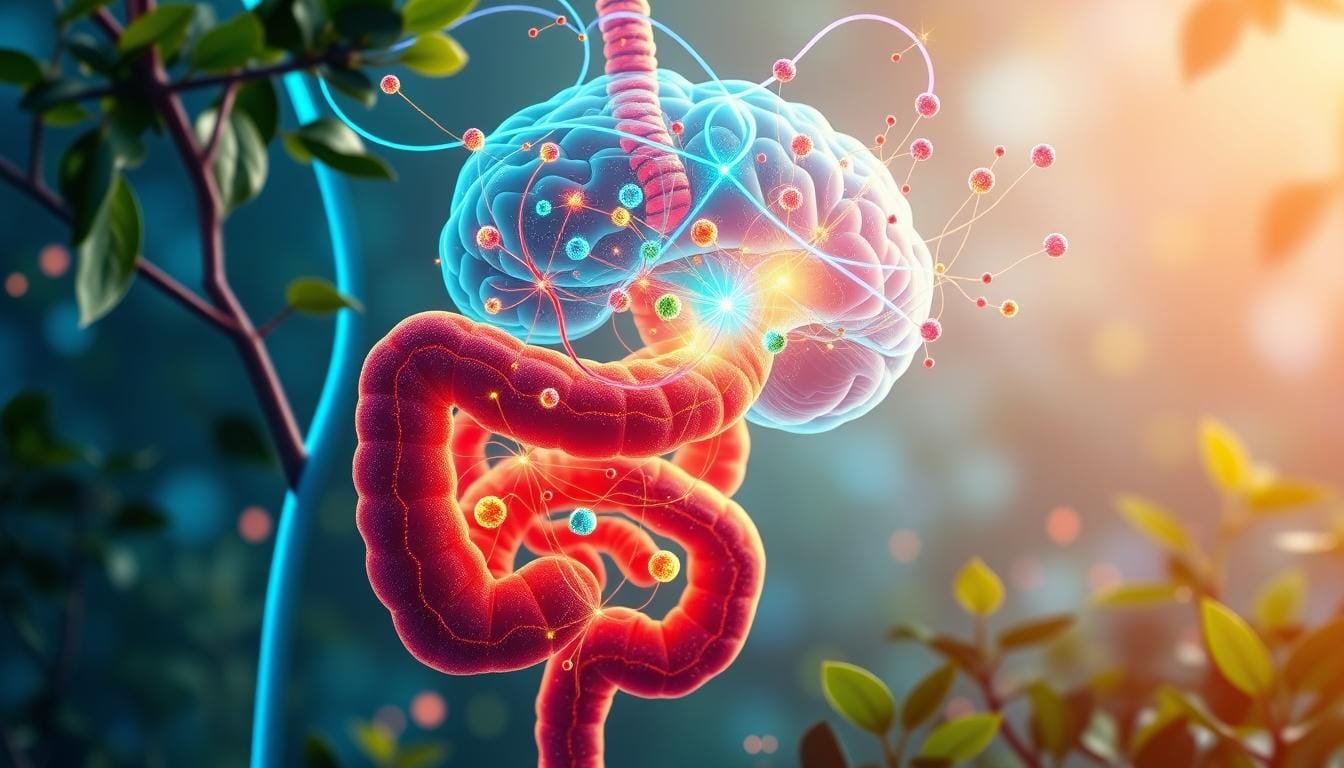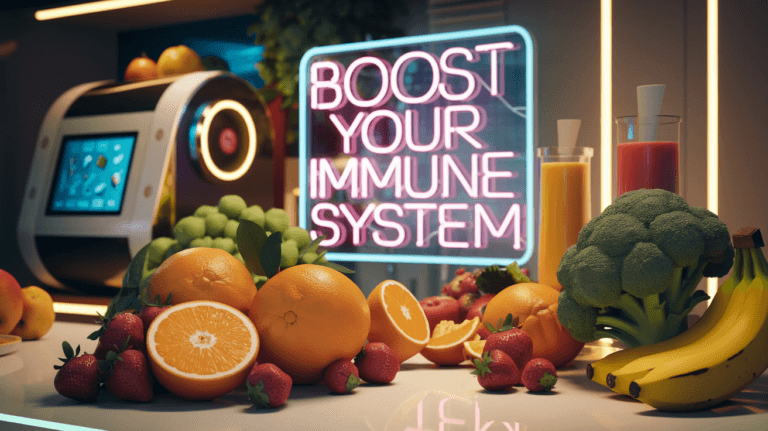The Connection Between Gut Health and Mental Clarity
The link between gut health and mental clarity is getting a lot of attention. Scientists are finding out how the digestive system affects our brain and thinking skills. The gut and brain talk to each other through a complex network, affecting our mood and mental sharpness1.
The gut has its own “second brain” with about 500 million neurons. It can work on its own and talk to the main brain. This lets the gut send messages to the brain, affecting how we feel and think2.
The gut makes a lot of serotonin, which makes us happy and helps our body’s rhythm2. Problems with gut bacteria can lead to mental health issues. Studies show many people with gut problems also have depression and anxiety1.
Research is ongoing to understand how the gut and brain talk to each other. Scientists are looking into how certain probiotics can help our gut and mood. They’ve seen mice with better gut health and mood, thanks to probiotics12. They’re also studying how our gut affects our thinking and memory, and how it impacts our health1.
Key Takeaways
- The gut-brain axis allows bidirectional communication between the digestive system and the brain, influencing mood, health, and cognitive function.
- The enteric nervous system, or “second brain,” contains approximately 500 million neurons and can operate independently while communicating with the central nervous system.
- The gut produces a significant amount of serotonin, a neurotransmitter that contributes to feelings of happiness and regulates the body’s internal clock.
- Imbalances in gut bacteria have been linked to mental health conditions, with a higher prevalence of depression and anxiety in individuals with IBS and functional bowel problems.
- Ongoing research explores the potential of probiotics to improve gastrointestinal health and mood, as well as the impact of digestive-system activity on cognition and metabolic health.
The Gut-Brain Axis: How Your Digestive System Affects Your Mind
The gut-brain axis is a complex network that links the digestive system and the brain. It lets them talk to each other and affect each other’s actions. At its core is the enteric nervous system, a huge network of over 100 million nerve cells in the gut3. This “second brain” is key in controlling gut functions and talking to the main brain.
The vagus nerve is the main link between the gut and the brain. It sends messages about the gut’s state to the brain and carries signals from the brain to the gut4. Research shows that giving animals probiotics can lower stress hormones. But, this effect disappears when the vagus nerve is cut, showing its vital role4.
The gut microbiome, filled with trillions of beneficial bacteria, is also crucial. These bacteria make neurotransmitters like serotonin, known as the “happiness hormone.” In fact, 90% of serotonin is made in the gut and then goes to the brain, affecting our mood5. Imbalances in the gut microbiome have been linked to mental health issues, with certain bacteria possibly causing these problems4.
The gut-brain axis works both ways, with the gut influencing the brain and vice versa. Stress, anxiety, and depression can mess with gut functions, causing digestive problems. People with Crohn’s disease or IBS have higher stress markers and weaker vagus nerve function4. Also, 40-90% of IBS patients experience anxiety or depression because of their gut issues5.
Keeping a healthy gut microbiome is key for good gut-brain communication and mental health. Eating fruits, veggies, spices, and herbs helps reduce stress and supports gut health3. Eating fermented foods with probiotics can also help with social anxiety in anxious people4. By taking care of the gut-brain axis through diet, stress management, and a healthy lifestyle, we can improve both our digestion and mental health.
The Role of the Gut Microbiome in Mental Health
The gut microbiome is a complex mix of trillions of microorganisms. It plays a key role in both physical and mental health. Recent studies have shown how the gut and brain are connected. This connection affects mood, cognition, and mental health disorders.

Beneficial Bacteria and Their Impact on Mood and Cognition
Beneficial bacteria like Bifidobacterium and Lactobacillus are vital for a healthy gut. They help produce neurotransmitters like GABA, which affects mood. A study found that those with less Bacteroides had lower quality of life and more depression6.
Some foods, like Brazil nuts and dark chocolate, can also impact mood and cognition7. Eating a Mediterranean diet, full of plants and healthy fats, boosts butyrate-producing bacteria. This is good for cognition and reduces inflammation6. Probiotics also improved Alzheimer’s disease patients’ mental state in just 12 weeks6.
Dysbiosis: When Gut Bacteria Imbalance Leads to Mental Health Issues
Dysbiosis, or an imbalance in gut bacteria, is linked to anxiety and depression. People with less diverse gut microbiomes face these mental health challenges more often. Changing to a vegetarian or Mediterranean diet can improve mood and happiness, even without changing gut diversity7.
The link between diet, gut microbiome, and mental health is complex. Here are some findings:
- Eating more fat and protein can lower anxiety and depression. But eating more carbs can increase stress and depression7.
- Diet changes can greatly affect the gut microbiome in mice, with genetics playing a smaller role7.
- The ketogenic diet can change the gut microbiome in children with epilepsy. It may help control severe epilepsy through the gut7.
| Diet | Effect on Gut Microbiome | Mental Health Impact |
|---|---|---|
| Mediterranean | Higher ratio of Bacteroidetes to Firmicutes | Enhanced cognition, reduced inflammation |
| Ketogenic | Changes in taxonomic and functional composition | Potential benefits for controlling epilepsy |
| High animal protein, saturated fats, and sugars | Reduced gut microbiota diversity | Potentially detrimental to mental health |
Gut-Friendly Foods for Optimal Mental Clarity
The link between gut health and mental well-being is clear. Eating foods that are good for your gut can help your digestion and nutrient absorption. This is key for a healthy body8. Foods like probiotics, prebiotics, and fiber can improve your gut health9.
Probiotic-Rich Foods: Yogurt, Kefir, and Fermented Vegetables
Probiotic foods add good bacteria to your gut. Yogurt with “Live & Active Cultures” has millions of probiotics per gram9. Kefir and fermented veggies like sauerkraut and kimchi are also great sources.
Miso, kimchi, sauerkraut, and kefir are good for your gut. They are part of a healthy diet10. Sauerkraut has 4 grams of fiber per cup, which is good for your gut9.
Prebiotic Foods: Fueling the Growth of Beneficial Gut Bacteria
Prebiotic foods feed the good bacteria in your gut. Foods like inulin and fructans help the probiotics grow9. Artichokes, leeks, and bananas are good for your gut bacteria10.
Jerusalem artichokes are full of inulin, a prebiotic fiber. Raw onions are a source of prebiotics and antioxidants like quercetin8.
Fiber-Rich Foods for Digestive Health and Mental Well-being
Fiber-rich foods are good for your gut and brain. Eating more fruits and veggies is better for your gut10. Peas and Brussels sprouts are full of fiber that good bacteria love10.
Bananas are a good source of fiber and minerals. Dandelion greens are full of fiber, vitamins, and minerals8.
| Gut-Friendly Food | Benefits |
|---|---|
| Yogurt | Contains live and active probiotic cultures |
| Sauerkraut | Rich in fiber and probiotics |
| Jerusalem Artichokes | High in prebiotic inulin fiber |
| Peas | Full of soluble and insoluble fiber |
Eating a variety of gut-friendly foods can improve your digestion and mental clarity. A healthy gut reduces inflammation and prevents diseases like heart disease and cancer9.
The Impact of Stress on Gut Health and Mental Clarity
Stress is common in today’s world, but its effects on our gut and mind are often ignored. When we’re stressed, our body releases cortisol, a hormone that can upset the balance of gut bacteria and cause inflammation11. This imbalance, known as dysbiosis, can lead to digestive problems and affect our mental health.
Research shows that stress quickly changes the types of bacteria in our gut11. Hormones released during stress can make certain bacteria levels soar by 10,000-fold in just 14 hours11. This change in gut bacteria can deeply affect our mental health, as most of our serotonin, which helps regulate mood, is made in the gut12.

Long-term stress can also cause leaky gut syndrome, where the gut lining lets harmful substances into the bloodstream12. This can cause symptoms like brain fog, anxiety, and depression, showing how gut health and emotional well-being are connected12.
Studies have found that stressed individuals have unpredictable gut bacteria patterns, with depressed people often having more harmful bacteria11. A comparison of depressed and non-depressed people showed differences in 279 bacteria-synthesized proteins, mainly related to metabolism11. Depression has seen a huge increase worldwide since COVID-19, affecting nearly 264 million people13.
“The human gut is quite literally a second brain, with the enteric nervous system being the second largest concentration of neural tissue in the body.”
– Dr. Emeran Mayer, Professor of Medicine and Psychiatry at UCLA
Stress can also change what we eat, making us more likely to choose comfort foods11. After eating fast food, women who were stressed the day before had lower fat burning and higher insulin levels than those who weren’t stressed11. Women with depression had higher cortisol and fat burning after eating compared to those without depression11.
| Gut Health Factor | Impact on Mental Health |
|---|---|
| Serotonin Production | 90% produced in the gut, regulating mood |
| Chronic Inflammation | Linked to increased rates of mood disorders and cognitive decline |
| Immune System | 70% resides in the gut, essential for physical and mental health |
Promising research suggests that diet modification can produce detectable shifts in some bacterial species within 24 hours11. Probiotics, prebiotics, and synbiotics may help reduce stress effects and improve mental health13. By understanding the link between stress, gut health, and mental clarity, we can support our overall well-being and resilience.
Gut Inflammation and Its Effects on Brain Function
The gut and brain are closely linked. When the gut is inflamed, it can harm our thinking abilities. This inflammation releases harmful substances that can affect our brain, leading to stress and imbalances14. It can even cause mental health issues like depression15.
The gut microbiome is key for keeping inflammation in check and supporting brain health. It houses trillions of microbes that help our brain and immune system16. In fact, most of our serotonin, which helps us feel good, is made in the gut1615.
The Link Between Gut Inflammation and Cognitive Decline
Long-term gut inflammation can lead to memory loss, mainly in older people. As more people live longer, keeping the gut healthy becomes crucial for sharp thinking.
A study of 23 articles with over 1,700 participants showed that probiotics can help older adults and those with memory issues14. This means taking care of our gut might help prevent memory loss.
Anti-Inflammatory Foods to Support Gut and Brain Health
Eating foods that fight inflammation can help our gut and brain. Some of these foods include:
- Fermented foods like yogurt and pickles, which boost gut health with probiotics16
- Fiber-rich fruits and veggies, which feed good gut bacteria1615
- Dark chocolate, coffee, and tea, which are good for our brain and gut16
But, eating too much sugar can harm our gut and cause inflammation16. Choosing the right foods and adding prebiotics, probiotics, and symbiotics to our diet can improve our brain and mood14.
The Importance of a Diverse Plant-Based Diet for Gut and Mental Health
A plant-based diet is key for gut health and mental well-being. It includes fruits, vegetables, whole grains, and legumes. Research shows that plant-based diets have a different gut microbiota than meat-based diets, with small differences between vegans and vegetarians17.
Eating a variety of plants can make your gut microbiome more diverse17. This diversity is vital for a healthy digestive system, immune system, metabolism, and appetite18.
Studies found that eating 30 different plants a week boosts gut health19. Those who ate 30 or more plants a week had more “good” gut bugs than those eating just 1019. This variety may also lower cancer and chronic disease risks19.
Plants are rich in fiber, prebiotics, and phytochemicals that feed the gut microbiome. Plant fibers increase beneficial bacteria and reduce harmful ones17. Polyphenols in plants boost beneficial bacteria, offering protection against diseases17.
Adding certain foods to your diet can help your gut and brain stay healthy:
- Whole grains: Better for blood sugar and fats than refined grains19.
- Nuts and seeds: Rich in protein, fiber, and healthy fats19.
- Leafy green vegetables: Boost the plant count in meals19.
- High-prebiotic foods: Support probiotic growth in the gut18.
| Gut Microbiome Composition | Vegan/Vegetarian Diet | Omnivorous Diet |
|---|---|---|
| Bacteroidetes-related operational taxonomic units | Significantly higher counts | Lower counts |
| Bifidobacterium and Lactobacillus | Increased by polyphenols in plant foods | Lower levels |
People with diverse gut microbiomes tend to have better mental health17. A vegan diet for 16 weeks can lead to weight loss and lower fat levels18. This suggests a vegan diet’s benefits for gut health and inflammation17.
“Let food be thy medicine and medicine be thy food.” – Hippocrates
In summary, a diverse plant-based diet is crucial for gut health and mental well-being. By eating a variety of fruits, vegetables, whole grains, and legumes, you support beneficial gut bacteria, reduce inflammation, and improve health.
Probiotics and Prebiotics: Supplements for Gut and Mental Well-being
Probiotics and prebiotics are key supplements for a healthy gut and clear mind. Probiotics are live bacteria that balance the gut microbiome. Prebiotics feed these good bacteria, helping them grow and keeping the gut healthy20.
Studies show that good gut bacteria boost the immune system and fight obesity21. A 2019 review found that probiotics and prebiotics can ease depression and anxiety21. They help increase good bacteria and reduce bad ones, linked to a higher BMI21.
Choosing the Right Probiotic Supplement for Your Needs
When picking a probiotic, look at the strains, CFU count, and how to store it. Bifidobacterium and Lactobacillus are top strains. But, the success of probiotics depends on the strain, formula, quality, and storage21.
Some people, like those with SIBO or IBS, might not get benefits from probiotics or prebiotics. It’s best to talk to a healthcare expert about these supplements. Too much can cause side effects21.
Prebiotic Supplements: Supporting the Growth of Beneficial Gut Bacteria
Prebiotics feed good gut bacteria, boosting their growth and gut health. Butyrate from prebiotic fiber is key for gut health21. Here are some top prebiotic ingredients:
- Chicory root, with 68% prebiotic fiber, improves digestion and bowel function22.
- Garlic boosts good bacteria and fights off bad ones, supporting the immune system22.
- Onions, with inulin and FOS, strengthen gut flora and aid in fat breakdown22.
- Oats, with beta-glucan fiber, act as prebiotics and lower cholesterol22. They’re a great prebiotic food choice20.
Adding probiotics and prebiotics to your diet, along with fermented foods and fiber, can greatly improve gut and mental health20.
Lifestyle Factors That Influence Gut Health and Mental Clarity
Our gut health and mental well-being are closely linked. Lifestyle choices, like sleep and exercise, play a big role in keeping this balance. These factors are key to the gut-brain axis.
The Role of Sleep in Maintaining a Healthy Gut and Mind
Sleep helps regulate our body’s internal clock, affecting digestion and enzyme production. Research shows that our gut microbiome varies a lot, with most being Bacteroidetes and Firmicutes23. Good sleep helps grow these beneficial bacteria, keeping our gut diverse and healthy24.
Not getting enough sleep can cause gut inflammation, leading to health problems, including mental issues24. Sticking to a sleep schedule and focusing on quality sleep supports a healthy gut-brain connection.
Exercise and Its Benefits for Digestive and Mental Health
Regular exercise also impacts gut health and mental clarity. It boosts gut movement, reducing digestive problems like constipation24. Exercise also helps grow diverse gut bacteria, vital for a balanced microbiome.
Studies found three main gut microbiome types, each dominated by different bacteria23:
| Enterotype | Dominant Bacteria |
|---|---|
| I | Bacteroides |
| II | Prevotella |
| III | Ruminococcus |
Regular exercise promotes beneficial bacteria growth across these types, improving gut and mental health23. It also lowers stress, benefiting both digestion and mental health24.
The gut microbiome is key to our health, and lifestyle choices like sleep and exercise are vital for its balance and diversity.
By focusing on quality sleep, regular exercise, and stress management, we can enhance our gut-brain connection. This leads to better mental clarity and overall well-being. As research deepens the connection between gut and mental health, it’s clear that a gut-friendly lifestyle is crucial for cognitive and emotional balance.
Gut-Brain Communication: Neurotransmitters and Signaling Molecules
The gut-brain axis is a fascinating two-way communication system. It connects our digestive system and central nervous system. This network uses neurotransmitters and signaling molecules to share information between the gut and brain25.
The gut is often called the “second brain.” It makes a lot of serotonin, dopamine, and GABA. These chemicals are key for mood, appetite, sleep, motivation, and stress responses25.
The gut microbiome, with trillions of bacteria, controls digestion and sends signals to the brain. It affects emotions, mental health, and behavior25. Changes in the microbiome can lead to neurological disorders, showing how vital a balanced gut is26.
The vagus nerve is a key path for communication between the gut and brain. It lets neurotransmitters and hormones send messages between these systems2625.
| Neurotransmitter | Function |
|---|---|
| Serotonin | Mood regulation, appetite, sleep |
| Dopamine | Motivation, reward-seeking behavior |
| GABA | Anxiety and stress regulation |
Intestinal epithelial cells, including enterocytes and enteroendocrine cells, are crucial for gut-brain communication26. They help with hormone secretion, regulating functions, and immune responses. These actions are part of the complex signaling between the gut and brain26.
The gut-brain connection is a powerful force that influences various bodily functions, including digestion, mood, pain sensitivity, immune responses, and cognitive function.
Keeping a healthy gut microbiome is key for good gut-brain communication. Eating a fiber-rich diet and managing stress can help. This supports a balanced gut and mental well-being25. Understanding the relationship between neurotransmitters, signaling molecules, and the gut-brain axis shows how our digestive health affects our mental state.
Gut Health and Mental Disorders: Anxiety, Depression, and Beyond
Recent studies have shown a strong link between gut health and mental health issues like anxiety and depression. The gut microbiome plays a big role in our mental well-being27. Our gut is home to trillions of microbes, crucial for digestion, immune function, and vitamin production28.
Research has found that mental health conditions like anxiety and depression are linked to the gut microbiome28. An unbalanced gut microbiome, or dysbiosis, can lead to various health problems, including mental health issues27. Interestingly, about 90% of our serotonin, which affects mood, is made in the gut27.
Gut dysbiosis is tied to inflammation, which is linked to depression and anxiety27. People with depression often have different gut bacteria than those without27. Studies also show that higher levels of inflammation and lower levels of anti-inflammatory cytokines are linked to depression29.
The Potential of Gut-Targeted Therapies for Mental Health Conditions
Gut health therapies are being explored as treatments for mental health issues. These therapies aim to balance the gut microbiome, reduce inflammation, and improve gut-brain communication.
Psychobiotics, special probiotics for mental health, show promise in reducing anxiety and depression symptoms. Prebiotics, which feed good gut bacteria, can also improve emotional well-being and sleep quality28.
Fecal microbiota transplantation (FMT) is another therapy being studied. It involves transplanting healthy gut bacteria from a donor into a patient. Studies in rats suggest FMT could treat mental health disorders29.
Lifestyle changes can also support gut and mental health. Eating a diet rich in fruits, vegetables, and whole grains is beneficial2729. Managing stress, using probiotics and prebiotics, and avoiding processed foods and sugar are also important27. Regular exercise can also boost beneficial gut microbes, improving gut health28.
Conclusion
The link between gut health and mental clarity is clear. The gut-brain axis is key in this connection. About 90% of neurotransmitters in the brain are also in the gut, showing a strong bond between gut health and mental well-being30.
Imbalances in the gut microbiome can lead to depression and anxiety. The vagus nerve, linking the gut and brain, affects mood and physical health30.
To support gut health and mental clarity, a holistic approach is needed. Eating a diverse plant-based diet is crucial. This diet should include fruits, vegetables, omega-3 fatty acids, and fermented foods.
The daily fruit and vegetable intake should be 3 cups of assorted vegetables and 2 cups of fruit. For those consuming 2,000 calories a day, this is recommended. The National Institutes of Health suggest 1.1 to 1.6 grams of omega-3 fatty acids for adults aged 18 and over31.
Probiotics in fermented foods can help reduce anxiety and depression symptoms. This shows how gut health impacts mental health30.
Avoiding harmful foods is also key. Foods like excessive refined sugar, artificial sweeteners, fried foods, and animal-based diets can harm gut health. These foods can lead to inflammation, poor blood sugar balance, and higher toxin levels31.
By focusing on a gut-friendly lifestyle, including stress management, enough sleep, and exercise, mental clarity and resilience can be promoted.
Research is still uncovering the gut-brain axis relationship. Gut-targeted therapies may help treat mental health disorders and improve cognitive function. Understanding the gut-brain axis and adopting a holistic approach to gut health can improve mental clarity and overall well-being.
FAQ
What is the gut-brain axis, and how does it influence mental clarity?
How does the gut microbiome affect mental health?
What are some gut-friendly foods that can promote optimal mental clarity?
How does stress impact gut health and mental clarity?
What role does gut inflammation play in brain function and cognitive decline?
Why is a diverse plant-based diet important for gut and mental health?
How can probiotic and prebiotic supplements support gut and mental well-being?
What lifestyle factors influence gut health and mental clarity?
How do neurotransmitters and signaling molecules affect gut-brain communication?
Is there a link between gut health and mental disorders like anxiety and depression?
Source Links
- The Brain-Gut Connection – https://www.hopkinsmedicine.org/health/wellness-and-prevention/the-brain-gut-connection
- The Gut-Brain Connection: How it Works and The Role of Nutrition – https://www.healthline.com/nutrition/gut-brain-connection
- Feeding the Gut-Brain Connection – Orgain Healthcare News – https://healthcare.orgain.com/news/feeding-the-gut-brain-connection/
- Gut-Brain Connection: What It Is, Mental Health, and Diet – https://zoe.com/learn/gut-brain-connection
- The gut-brain connection: The secret behind how gut health affects mental health – Oshi Health – https://oshihealth.com/how-gut-health-affects-mental-health/
- Role of diet and its effects on the gut microbiome in the pathophysiology of mental disorders – https://pmc.ncbi.nlm.nih.gov/articles/PMC9021202/
- The Role of Diet on the Gut Microbiome, Mood and Happiness – https://pmc.ncbi.nlm.nih.gov/articles/PMC10055576/
- 10 Foods to Build Your Gut Microbiome – https://www.healthline.com/health/10-gut-foods
- Best Foods to Eat for Gut Health – https://www.eatingwell.com/article/2059033/best-and-worst-foods-to-eat-for-gut-health/
- 15 foods for good gut health – https://www.benenden.co.uk/be-healthy/nutrition/gut-food-15-foods-for-good-gut-health/
- Stress, depression, diet, and the gut microbiota: human–bacteria interactions at the core of psychoneuroimmunology and nutrition – https://pmc.ncbi.nlm.nih.gov/articles/PMC7213601/
- How Gut Health Impacts Mental Health |Beyond Healing Counseling Now 2024 – https://beyondhealingcounseling.com/how-gut-health-impacts-mental-health/
- Gut Biome and Mental Health: Do Probiotics Work? – https://pmc.ncbi.nlm.nih.gov/articles/PMC10337499/
- Exploring the Influence of Gut–Brain Axis Modulation on Cognitive Health: A Comprehensive Review of Prebiotics, Probiotics, and Symbiotics – https://pmc.ncbi.nlm.nih.gov/articles/PMC10975805/
- Gut-Brain Connection: How Gut Health Influences Mental Wellbeing – https://asktia.com/article/gut-health-mental-health-connection
- How to boost your gut and brain health (at the same time) – https://www.bswhealth.com/blog/why-caring-for-your-second-brain-can-improve-your-health
- The Effects of Vegetarian and Vegan Diets on Gut Microbiota – https://pmc.ncbi.nlm.nih.gov/articles/PMC6478664/
- 16-Week Vegan Diet Can Do Wonders for Gut Microbiome – https://www.healthline.com/health-news/how-a-16-week-vegan-diet-can-improve-your-gut-microbes
- Eating 30 Plants per Week: How To Do It and Why – https://zoe.com/learn/30-plants-per-week
- 12 Foods to Improve Your Gut Health Overnight – https://www.eatingwell.com/article/8021156/foods-to-improve-gut-health-overnight/
- Probiotics and Prebiotics: What’s the Difference? – https://www.healthline.com/nutrition/probiotics-and-prebiotics
- 19 Prebiotic Foods You Should Eat – https://www.healthline.com/nutrition/19-best-prebiotic-foods
- Exploring the gut microbiota: lifestyle choices, disease associations, and personal genomics – https://pmc.ncbi.nlm.nih.gov/articles/PMC10585655/
- How to Improve and Reset Gut Health – https://www.healthline.com/health/gut-health
- What is the gut-brain connection? – https://www.helpguide.org/wellness/nutrition/gut-brain-connection
- Gut-Brain Connection: Microbiome, Gut Barrier, and Environmental Sensors – https://pmc.ncbi.nlm.nih.gov/articles/PMC8263213/
- The Link Between the Gut Microbiome and Mental Health – Blue Tree Nutrition – Greater Carmel, Indiana – https://www.bluetreenutrition.com/link-between-gut-microbiome-and-mental-health/
- Happy Foods for a Happy Gut — Gastro Florida – https://gastrofl.com/happy-foods-for-a-happy-gut/
- Of Microbes and Mental Health: Eating for Mental Wellness | ASM.org – https://asm.org/articles/2020/february/of-microbes-and-mental-health-eating-for-mental-we
- What are the best foods for good gut health?: A Comprehensive Guide | Nutrition Counseling – https://www.sunshinecitycounseling.com/blog/foods-for-good-gut-health-a-comprehensive-guide
- Best & Worst Foods for Gut Health – https://www.patagoniaprovisions.com/blogs/learn/best-and-worst-foods-for-gut-health?srsltid=AfmBOorV9apdqANdGNJDzXq7a-b-Q_7FOa0Wfc1nfiHpoc3_OQX-6uXv







